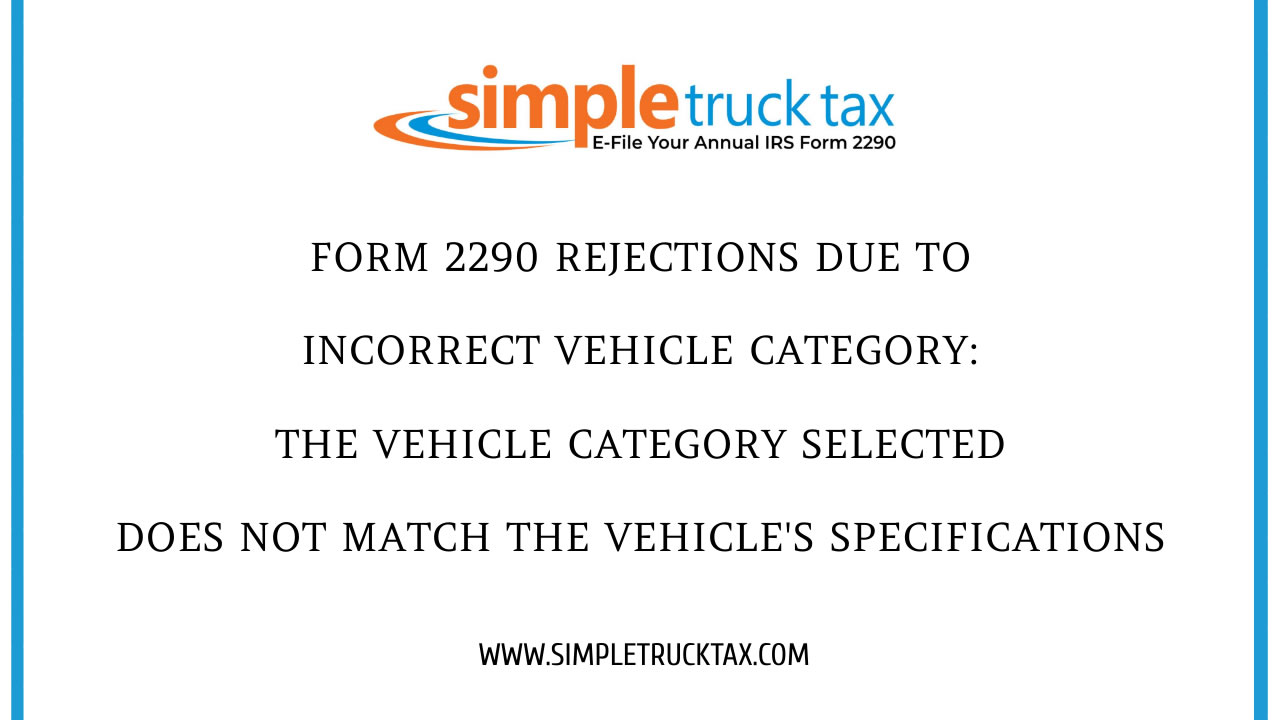
Form 2290 rejections due to Incorrect Vehicle Category: The vehicle category selected does not match the vehicle's specifications
Understand Form 2290 and the Need for the Same
Form 2290 is an important document from the IRS, known as the Heavy Highway Vehicle Use Tax Return, which owners of heavy highway vehicles with a gross taxable weight of 55,000 pounds or more are required to file. This form is very vital in making sure that the vehicle owners adhere to the federal tax regulations and are lawfully allowed to run their vehicles on the public highways.
Choosing the Right Category of Vehicle
The most critical part of Form 2290 is selecting the correct category for your vehicle. The IRS has been specific with the categories regarding what kinds of vehicles are classified under them, based on gross weight, usage, or type, which are used in calculating the amount of tax one has to pay or other qualifications such as exemptions or reduced rates on tax.
Mistakenly choosing a vehicle category can amount to serious consequences; for instance, this small mistake can get your Form 2290 rejected, and you might end up facing problems like delays, fines, and even legal issues.
Common Reasons for Form 2290 Rejections
One of the most common reasons for Form 2290 being rejected is incorrect vehicle category. The vehicle category that one picks should agree with the specifications of the vehicle regarding gross weight, purpose, and use. Here are some of the most frequent mistakes:
- Choosing the Wrong Category Based on Gross Weight: The gross weight of your vehicle is one of the most important factors in determining its category. A mistake here can lead to an incorrect tax computation and rejection of your form.
- Mismatching of Vehicle Type: There are different types of vehicles, such as agricultural and logging, and then there is the regular commercial one. If you misselect it, there will be a mismatch, hence your form will be rejected by the IRS.
- Mileage Misrepresentation: Limited-use vehicles, such as agricultural vehicles or those driven fewer than 5,000 miles in one calendar year—7,500 miles for agricultural vehicles—are taxed at a lower rate or exempted from tax. Inadequate mile reporting can lead to misselection of vehicle category.
The Penalties for Choosing the Wrong Vehicle Category
If the vehicle category you opt for does not turn out to be a match with the actual specifications of the vehicle, then the IRS will reject your Form 2290. This rejection may further have a series of implications, including:
- Delays in Tax Payment: A rejected form means you'll have to correct the error and resubmit, thus delaying possibly your tax payment and attracting fines or penalties.
- Legal and Operational Risks: Any vehicle running without the Form 2290 has legal problems, fines, and the ineligibility of an application for vehicle registration.
- Additional Paperwork and Hassles: You will need to correct the error, refurnish the form, and probably other supporting documents to be attached that increase hassle and time you will put in for compliance.
The steps below will help you avoid frustration from Form 2290 rejections due to incorrect vehicle category selection:
- Check Your Vehicle Specs: Be sure to check the gross weight, type, and usage of your vehicle before filing. You may want to refer to your reports for the vehicle or seek help from a tax professional if necessary.
- IRS Guidelines: The Internal Revenue Service has laid down crystal-clear guidance regarding class of vehicles and its specifications. You could refer them to choose the correct category.
- Avail Tax Software: Most of the tax software is designed to help users file Form 2290 error-free. In most cases, these software programs incorporate checks to ensure that the vehicle category with its specification is matched.
- Seek Professional Help: If there is any confusion over which category your vehicle falls under, then professional help may need to be contracted. They will guide you on how to fill the intricacies of Form 2290 and file it in an appropriate way.
Proper filing of Form 2290 is useful to every heavy vehicle owner in avoiding the delays, fines, and other legal complications. Out of this, choosing the correct category for your vehicle proves to be crucial. Awareness of the causes for common rejections and steps to avoid them puts you in a position of being sure that upon submission, your Form 2290 will be accepted without any hitch and, therefore, your vehicle will be legally on the road.
Note: For more information, visit IRS website